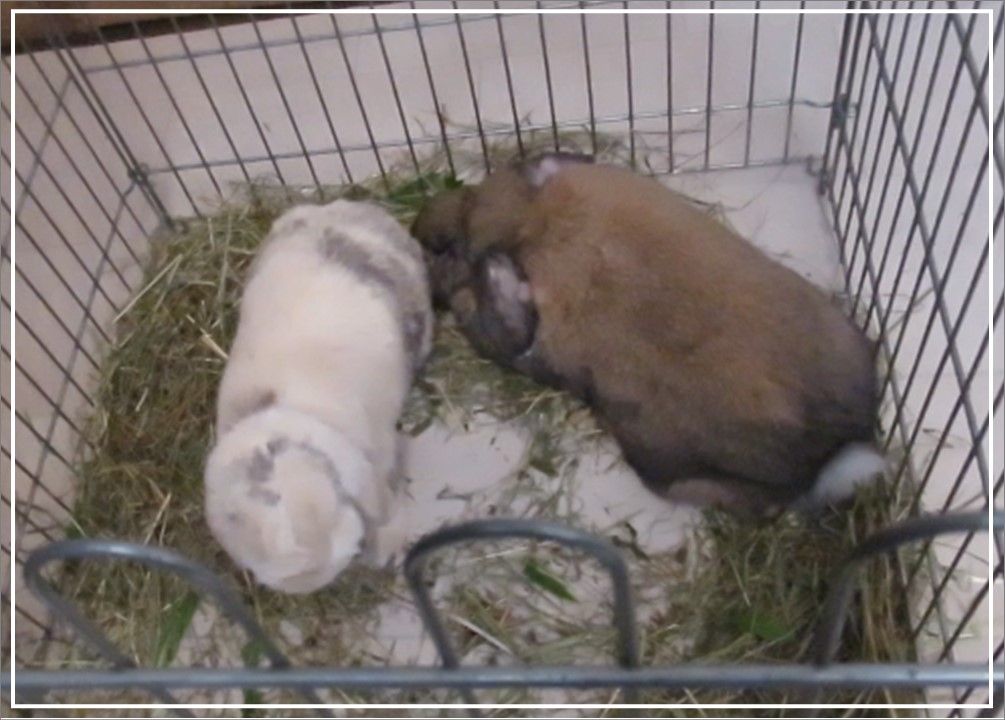bonding lessons #1 (aka a lesson in creating calm)

Other articles you might also enjoy:
are you feeling the overwhelm?
coincidence? or did he create his own reality?
are you hurting yourself as a people pleaser?
... and many more
Before I share about the first lesson we learned thanks to the beginning of our bonding journey with our bunnies, let me give you a brief history.
At the start of September 2022, our beautiful little princess, Forrest, passed away unexpectedly after a short illness. She left behind her long-term partner, best friend, and shadow of over 8 years, Bobo (the brown bunny in the photo).
Bobo grieved a lot after losing his best friend and, for such a healthy bunny, was constantly going through bouts of illness as a result of the emotions and grief he was processing. Whilst we tried to support and care for him as much as we could, we knew that nothing would help Bobo more than finding a new friend.
And so, in mid October 2022, we adopted Olaf (cream bunny in photo). We don't know Olaf's exact age - he's anything from 7 to 9 years, so possibly around a similar age to Bobo who turned 9 in October. Olaf, also, lost his partner last year, so they seemed the perfect pairing.
It's now mid February and due to both bunnies being ill, on and off, and ensuring Olaf had enough time to settle in to his new surroundings, we decided to only start the bonding process now.
Bunnies are extremely territorial animals and will fight (sometimes to the death) to protect their territory. So bonding bunnies can be a long and stressful process. However, once you succeed at bonding a pair (or more), the joy you and they get far outweighs the pain and struggle of getting there.
The first bonding session was extremely stressful. In the short 10-minutes the bunnies were together, there were quite a few fights that had to be nipped in the bud - whilst bunnies may fight to protect their territory in nature, to allow them to do so in a domestic setting is simply cruel and unnecessary.
The second bonding process on Day2 lasted longer (25-minutes) and there were only 4 short scuffles in that time, scuffles that were very quickly diffused.
Watching the bunnies, what I noticed was that every time Bobo moved, Olaf would get triggered and attack. As we adopted Olaf as an older bun, we don't fully know his history. However, going by scars and a tear on one of his ears it doesn't take Sherlock Holmes to gather that at some stage he was attacked by another animal, possibly a family cat. When you take that into consideration, you can begin to appreciate that it will take some time for Olaf to trust Bobo and realise that he's just a big softie.
Even if Olaf's attack was a few years ago, the trauma of the incident will have been programmed, unconsciously, into his body. The same goes for us, as humans. Traumas that go unhealed as soon as they arise, will become part of our programming. And how we react to events which are similar to the event leading to the trauma will be negatively influenced by our body's programming.
That's why continuous healing is so important for us.
What I also noticed from the bunnies' behaviour during the 25-minute session, was that Bobo remained mostly still. Yes, he could have been (and probably was) scared because he realised that every time he moved, Olaf attacked him. However, knowing Bobo as well as I do and knowing what a sensitive being he is, I also suspect that he realised his moving triggered Olaf and, so, chose to stay as still as possible so Olaf could have a chance to begin to relax and understand that Bobo wasn't out to hurt him.
In a situation which was stressful and overwhelming for both bunnies, Bobo managed to remain still/calm for the safety and benefit of them both.
When I look back at this bonding session, the phrase that comes into my head is from the Rudyard Kipling's poem, "If": "If you can keep your head when all about you are losing theirs and blaming it on you,... yours is the Earth and everything that’s in it."
When things are stressful and overwhelming it is easier to get caught up in the stress and the overwhelm than it is to remain calm and collected. And yet when you get caught up in the negative emotions, you're not benefitting you are anyone else in the situation. Rather you're adding to the chaos, to the negativity.
However, whilst we know it makes more sense and whilst we know it would be better for all involved, staying calm can be very challenging because many of our emotions are reactive and based on unconscious programming. The only way to control our emotive reactions is to take control of them; to breathe before we react, and then react consciously. And that takes practice, it takes strength of character, and it can, sometimes, demand a strong resolve.
So how do you remain calm when you're feeling overwhelmed?
That's the question I invite you to ponder. For guidance, I've turned, as always, to the angels through my oracle cards. And you can receive their guidance also by clicking the button below.
Viv xx
